Today marks the 25th anniversary of the premiere of “The Inner Light,” the penultimate episode of the 5th season of Star Trek: The Next Generation. This episode is consistently considered one of the best (if not THE best) of the series and even the entire franchise, although it was written by an outside freelancer. It also won writer Morgan Gendel a Hugo award. So to mark the occasion, TrekMovie talked to the Gendel about what it was like pitching and perfecting this Star Trek classic.
Pitching “The Inner Light”
Let’s go back to the genesis of “The Inner Light.” This script was your first Trek sale and you came in as an outsider with an unusually long pitch process between yourself and showrunner Michael Piller. You went back and forth a number of times. Did you know all along that this was something they were going to buy and you were just trying to get it right or was it more precarious?
Well I came in sort of the reverse of the way they worked on staff, which is they would come in with an emotional story they wanted to do and they would go to the tech guys – like Naren Shankar or Mike Okuda – and say, “How do we make this work?” And I thought as an outsider I had to really come in and knock their socks off with some tech or sci-fi thing that they haven’t thought of. Anything that I am going to come up with that is an emotional through line they are going to have thought of, but they hadn’t thought of something that beams a whole lifetime’s experience into your mind. That is what they knew had potential and I knew it had potential.
I can look at it both ways. On one hand Piller could have said right away, “This is a cool idea, let’s knock it around. Come back in tomorrow and we will get everybody in the room and we will knock it around, you are hired for this episode. Let’s make it work.” He could have done that but by the same token he could have said “I’m just not seeing it.” But what he did was take a path that worked out well for both of us which is he said, “Look, you have got something here. It’s not ready for us yet, but I urge you to come back.” What he was doing is that the Writers Guild has a rule that you can’t ask for free work. You can’t say, “We like this and you are going to be hired but you’ve got to come in and do all this and prove it.” The way he got around that is to say, “This isn’t ready so I am basically saying ‘no,’ but if you on your own want to come back and make it better, there is an open door.” So with a nod and a wink he was saying, “This is yours to lose, but you’ve got to make it work.”
So each time it kept on getting better. I thought that worked great because I was certainly willing to put in the time and I didn’t want to violate any Guild rules. Sure I would have been happier if he just hired me at the top but then again it might not have been as good and it might not have been as much mine. So I was happy to keep coming back and keep honing it. The breakthrough was when I proposed a romantic triangle [editor’s note: original idea involved Picard, Ro and Riker] and a wedding thing and I was too nervous and I just didn’t think it was my place to suggest it would be Picard who would get married, but once I skirted around that area Piller went right to that and said, “We’ve got to do this, and it has to be all about Picard” and that was that.
And all of that discussion was still in this unpaid pitch process before you even wrote a script or treatment even?
Yeah, but keep in mind even though I have come back and come multiple times and pitched it like five times – I have talked about this for so long as five times but for the life of me I can’t remember having enough to go back five times and him saying, “No, keep coming back” – but keep in mind at the point he accepts it, all we really have is a probe and the adventure where Picard has another life as a married man. That is it. I have to go home and come up with the supernova, the dying planet, why they are doing this and the circumstances behind this and all that stuff. And then we have to work on it in the writer’s room for a couple of days. So it is not like after five pitches I have what you now see as the episode. All that happened in the last pitch when he bought it was the probe zaps Picard and he is going to be in this mind adventure where he is a married guy with a family.
Fighting over a flute
The flute is a huge part of the story and very much associated with this episode. You were even involved in turning it into a retail item with Roddenberry. But apparently having Picard playing the flute was controversial. Can you talk through why they resisted and how you talked Piller into it?
This is going to be less dramatic than I should probably make it sound. It is as simple as the following: I suggested the flute as a way of letting the audience know Picard was a changed person. I had given it tons of thought on my own time. As I joked about, you don’t want him sitting there writing Eline’s name in his diary with hearts and bows. What are the options? It can’t be something he brings back as he was never really there. It has to be something that they had in the hold and it has to be something small. It can’t be something specific to their planet. It can’t be some sports thing he needs other people to play with so I had come up with the flute.
Here is the simplicity of it. I pitched it in one day and Michael – may he rest in peace, he had his good side and his difficult side – he just sort of humiliated me in the room. Like he thought it was going to be Herbie Mann doing a jazz solo or some hippie thing. He just made terrible fun of me and he thought it was ridiculous and I went home really distraught over this. But when I went back for the next day he says, “Well I thought about it and I think the flute is a really good idea.”
So they didn’t have any alternative suggestions on the way for Picard to take the story home with him?
No. I don’t even think we tossed around the question of how is he going to remember. Listen, as a freelancer I approached this thing differently. I don’t know if I am going to get another episode of Star Trek. And also I don’t know the politics of the room. When you are a baby writer who is in the writer’s room you kind of want to go with the flow and you are going to get a couple of shots and the room is going to figure things out and you are going to be the lucky person to write it. It is not that way as a freelancer. I come in and I want to make my mark. And the most amazing thing about this process is that they let me do so many things that were the kind of things I wanted to do personally. Either they didn’t get what I was trying to do or they were busy with other things but it is astounding just how much of my personal thing I got into this episode. I couldn’t believe it.
Getting the details right
The way the episode is structured is you start like any regular episode where the Enterprise encounters something and then you start to bounce back and forth between Picard’s life on Kataan getting older and the rest of the crew on the Enterprise dealing with Picard. Was that a difficult process of getting the right balance between Picard scenes and the Enterprise scenes? Was there ever consideration of focusing more on Picard’s life on Kataan and have the probe reveal later?
It is funny you ask that because you tell somebody the story and you would almost want it to be a shock when you come back and he is lying there and says it has only been 25 minutes. You almost want to never come back. He is zapped and you think he has been transported to another planet and you don’t know why and he comes out of it.
But I think it was smart to do it this way because it would have been too much not a Star Trek: The Next Generation episode if you didn’t have any of those other people. And there is a mystery going on which is: why is this happening and how do we stop it? I think that added to the jeopardy. If you didn’t have that and you were just with him on the planet you would start to think, “All right, he is on this other planet, how is he going to get out of here?” And then he is an old guy. Where is the jeopardy? I think the balance was good.
One of the things I am most impressed about working with these guys in the room was I remember when Piller was landing on the rules, which were that we would only do a time jump between commercials. That made it very clean and you weren’t bouncing back as much as you might remember. In between act breaks there was only one bounce. Like the snow starts falling and then it is winter, we didn’t do any of that.
With something so lauded as this episode is, it is hard to imagine making any changes. But you talk about the whole process of the writers room and at some point you had to hand the script off so they could create the final production version. Is there anything you wish that made it into the final version that didn’t? Would you change anything?
I don’t think so for a couple of reasons. First of all, Peter Allan Fields did the production draft and I got to say there are a couple of lines in there that I wish I had written. Peter wrote a lot of really good stuff, as you would hope anybody would do with the second draft. I would have done a lot of things too if I had gotten the notes from Michael, which I didn’t do because now they are rushing it into the production.
Because of the development process and my pitching and because of me working in the room, it was all there in the final draft, except for some lines which were improved. That story only deviated only a tiny bit. But beat by beat we worked it out in the room. I wrote it up as a beat sheet. Then for Star Trek under Piller you had to write a prose treatment like 10 pages and that goes to the network and you get notes on that. It was pretty well thought out before my first draft.
The only exception I would say – and I wouldn’t call this a regret – is because he had a different life with friends who don’t work for him, which we have never seen. We have seen Picard let down his hair a little bit with Riker, but he is the boss. So I thought this was an opportunity where he is not the boss and so I wrote in more than one friend than Batai. I wrote Picard and his buddies. It was sort of like a Judd Apatow movie with that very naturalistic style. I don’t mean blue but that sort ways guys are with their buddies. I wrote them like they were really teasing the shit out of him and how he was still talking about this starship. I don’t regret at all that it didn’t get in because the fans probably wouldn’t have liked it as much.
Hugos, Harlan Ellison, and the outsider’s perspective
Very few people who wrote for Star Trek also won Hugo Awards. There was Gene Roddenberry of course and then Ron Moore and Brannon Braga, who were two of the most prolific staff writers. But then there are two others. One is Harlan Ellison and then there is you.
And we have the number one and number two ranked Star Trek episodes … and he is number one.
And you two were outsiders, as you talked about before. And when you look at both of your episodes – “City on the Edge of Forever” and “The Inner Light” – they were both very emotional episodes for the show’s lead. And I just talked to Nick Meyer who was also an outsider who came in to Trek and wrote very personal stories for the leads in Star Trek II. Do you feel there is some sort of advantage for an outsider who can come in and maybe take more risks with the characters?
I would agree with that but I am not going to call it an advantage. It is not like we have anything over those guys. I would say you have an outlook – a point of view as an outsider that you are trying to beat whatever they do in the room because otherwise you don’t make it to the party. They are already invited to the party. You will only get in if you come up with something that is going to wow them. So you have to really search for the thing that is different. So I think it is point of view and a prod or impetus to do something a little different.
But I think what you are getting at is does it take that point of view to come up with something that maybe gets under the skin of the characters in a different way? And my answer to that would be, I would say global that. All of drama is really about being an outsider. You look at any show or any movie; there is something about how the main character is missing something that everybody else is onto. There is something that makes that person different; otherwise they wouldn’t be our main character.
So for “City on the Edge of Forever,” Spock and Kirk and McCoy are definitely outsiders. They are in a world that seems very alien to them and they have to get along. So that is the world you put them in and then you find the love story. And with “Inner Light” it is the same thing. I wasn’t modeling it at all after “City on the Edge of Forever.” In fact when I pitched that I probably wouldn’t have even known what that was. I watched it when I was a kid and didn’t think about it since then. But it is a similar pattern. Picard is a total outsider and he is in a strange world and trying to get along and learn what it takes to be human and love is the motivating factor.
So you look at those two things. When I teach screenwriting I say that is the starting point. How do you deal with somebody who is both an outsider and deal with the biggest emotions you can come up with, which is a love story. So that is not a bad starting point for any episode or movie.
On Die Hard and dogs
OK so I just fed your ego, let me go in the other direction. You wrote four episodes of Star Trek. “Inner Light” is very lauded. Then there are a couple of other solid ones with your Die Hard on the Enterprise “Starship Mine” and the Julian and Miles bonding/starting their friendship with “Armageddon Game” (DS9). But then there is another DS9 episode called the “The Passenger,” which to be frank is not a great episode.
It’s loathsome!
Of course not everything works. But I am curious as a writer, thinking of the day you handed in your various scripts, how much can you tell? In your mind, comparing the various days you handed in those scripts, could you tell the good ones from the bad ones. Did you feel the same?
No, I did not feel the same. At the time if you look at a crystal ball and told me “Starship Mine” would be on everyone’s top five list I would have believed that as much as “The Inner Light.” If we are talking about at the script stage I could have believed that. I mean Die Hard on the Enterprise, give me a break! Here is Picard as a swashbuckler.
You don’t always think things are equal when you turn things in. At script stage “Inner Light” seemed cool and touching and special because of the topic matter, but not like you thought “wow, this is going to stand the test of time” any more than say “Starship Mine.” When you see the rough cut that is different. At the rough cut of “Inner Light” I think everybody knew. I didn’t think they knew it was going to be a Hugo winner and number one of that series, but man we know it was something. The rough cut blew me away. I was used to seeing rough cuts where your so-called vision as a writer where you wonder, “Did people read the script? Did they understand and know what the characters are supposed to be doing?” But this couldn’t be more the opposite. It took everything I put in and more and totally elevated it. And I would say that is probably Sir Patrick’s performance more than anything. He wrote me a letter saying it was his favorite episode. It gave him stuff to do that he usually didn’t have the chance to do and he knocked it way out of the park.
But at script stage I thought it was really good and I thought “Starship Mine” was really good and I thought “Armageddon Game” was a very clever idea. I thought it was good but I wasn’t that close to it. Keep in mind Deep Space Nine wasn’t even on the air when I wrote that so I didn’t have anything to watch to guide me. But “The Passenger?” It was a dog.
So the day you handed it in you said “it sucks but here you go.”
A lot of TV is like that. It’s not that you think it is too sucky to be on the air but they are doing twenty four episodes a year and they are not all brilliant and they are not serialized so it is not like there is some big through line. You are going to have some stuff in there that is kind of filler. You always shoot for the moon but you know you are not coming close to the moon on most episodes. You’ve got to crank it out and if stuff is serviceable and leaves you with one good thing, that’s enough.
Life after Trek
For an outsider you were fairly active in Trek for a brief period with four episodes on the air over a 20-month period between ’92 and ’94, and then you moved on. Did you stop pitching Trek or were you drawn to other non-Star Trek projects?
I wasn’t hired on staff and then I got put on full time on another Paramount syndicated show – the 90s reboot of The Untouchables. And I was waiting for that to end to go on to Law and Order and there was no question I would take the Law and Order job. And I was also doing the TekWar movies – not the TV show which sucked but the TekWar movies which were pretty watchable with Bill Shatner. So I got more pulled to other things.
You have remained very active over the years including just spending a season on The 100. Do you find some of these younger writers know and ask you about “The Inner Light?”
It’s funny. With The 100 I didn’t know this right away, but a couple of people in particular on the staff were huge fans but didn’t want to bring it up. But you would be surprised. Not everybody knows about it. I think you have to be a specific kind of fan to be into that. It doesn’t come up that much, nor should it really. It is one thing at a convention, but if I am in a writer’s room talking about something I did 25 years ago, that is not a good thing. I have written too many things that I am very proud of and this thing is on a pillar – no pun intended – in a very rarefied world.
I understand your time with The 100 was to work as a sort of writer and coach for just the fourth season. I know you were working on something called The Convergence. Can you talk about that and anything else you are working on now?
Well only in the vaguest terms. I am right in the middle of pitching two really big projects. One is a very grounded sci-fi thing. It is a sort of a reboot of a Cold War idea where I injected a sci-fi twist. The other project is the opposite. It is a really fun action and adventure thing with a crazy character who happens to be from another planet. And there is another script I am very proud of that I developed with the Roddenberry company as they get into scripted material and there is some interest in that.
You asked about The Convergence. I keep coming back to this notion of the ‘theater in the mind’ that was in “The Inner Light.” This one I can talk about. It was a spec pilot I wrote. It is kind of a technique that the military came up with because they can’t torture people so it is a way to download a mind of a suspect but there is no computer built big enough to handle all that. The only thing comparable that can handle it is another human mind. So it is about a guy who is a sort of nerdy scientist who gets pressed into service and they are going to use his brain to put this terrorist mind into and then bad things happen.
In all the time I have been in the business I have never created my own show. I was either running a show created by somebody else or working on a show. I seem to be way more motivated now to create my own show. Maybe it is because the landscape has changed and you can do a broader range of stuff. Or maybe because I am the only boss I could really like. I am not sure.
Hoping for emotion and family in Discovery
One last thing before I leave you. Have you seen the new Star Trek: Discovery trailer and do you have any thoughts on it?
I did see it. I am not the biggest Star Trek fan – I hate to say that – but I am interested enough to see what this series is like. My immediate reaction and I know others have commented that it is more like the J.J. Abrams movies in tone than like the series. But others say that is just the trailer. So I am very interested in seeing what it is like. It is certainly glossy. I am impressed with the money they spent. They spend as much on a pilot now than it cost to make the original Star Wars movie. It is mindboggling.
I just hope the emotions and the emotional resonance and the camaraderie sit at the forefront, because that to me is the hallmark of Star Trek. It is the camaraderie. It is people who are stuck on a ship together and they are a family. It has never been overwhelmed by action on the series. The movie versions do that. So that is what I am looking to see. I am hoping that those things sit at the forefront and let the action be the wow factor and not the driving force.
“Inner Light” panel with Stewarts and Gendel at STLV
This summer’s official Star Trek Las Vegas convention (August 2-6) will include a special “Inner Light” celebration on Friday night with Morgan joined by Sir Patrick Stewart and his son Daniel Stewart (Young Batai) as well as Margo Rose (Eline).
To keep up with Morgan you can follow him @morgangendel on Twitter and visit his website morgangendel.com.

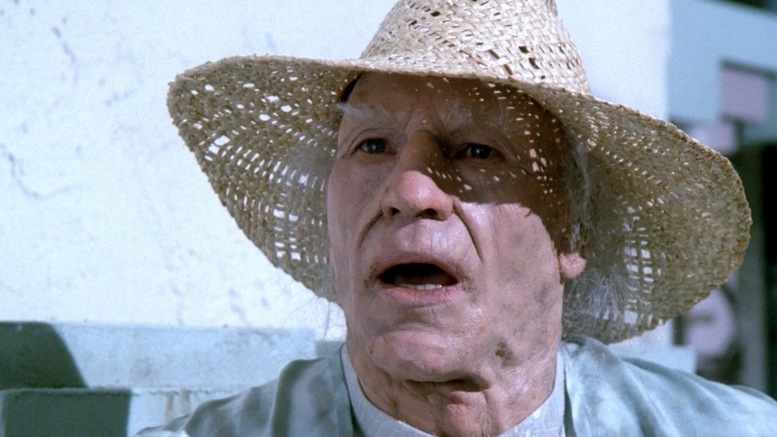
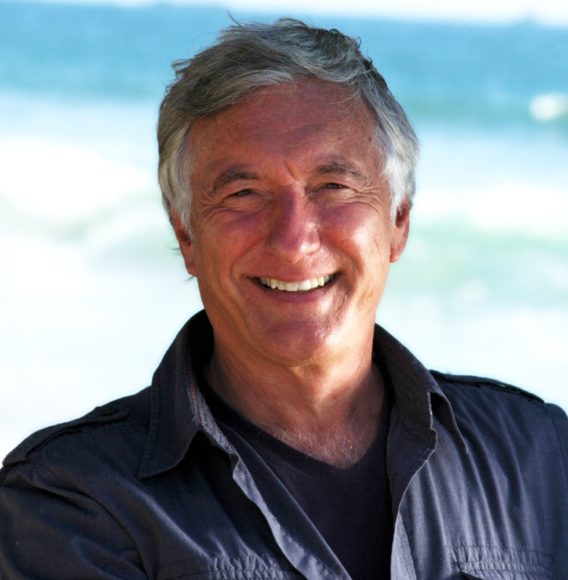
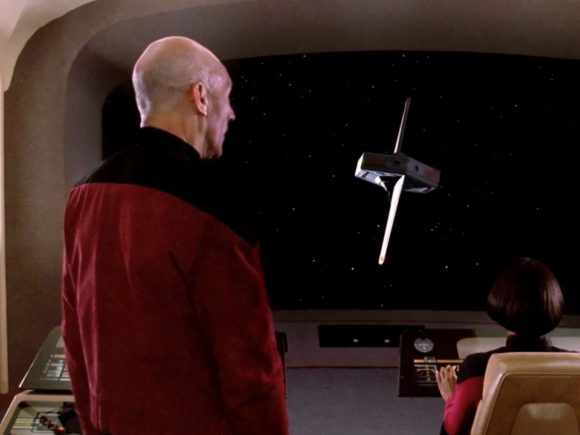


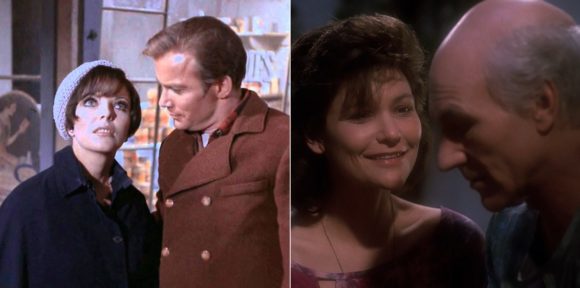

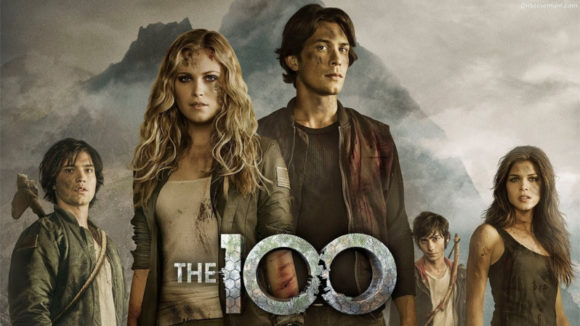
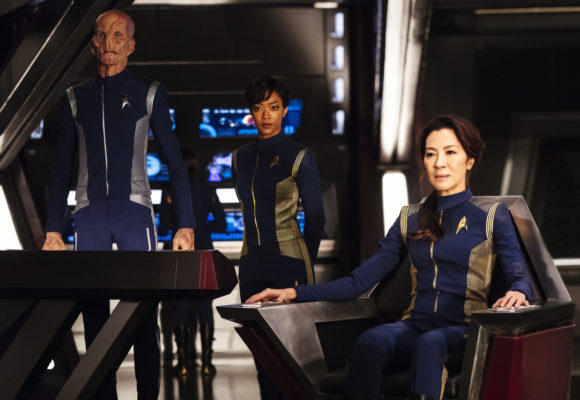


Its a good episode “The Inner Light”. But the scope of the episode is just far too big for 40 minutes in my view.
Why could the TNG producers shorten Season 5, knock a couple of episodes off the season and just make a big 80 minutes finale episode (Inner Light) for the fifth season?
I know what you mean, but I don’t agree. Drawing it out would have only meant showing more of Picard’s day-to-day life, which could have easily made the episode drag. Likewise, there was little going on back at the Enterprise, where much less time elapsed. While I wouldn’t mind an expanded version of this episode, there’s really not enough there for a two-parter. Likewise with “The Paradise Syndrome”, in which a lot happens in the course of a 52 minute episode which compresses two months, rather than a lifetime. While they could have shown more of Kirk and Miramanee’s life together, there was really no need, and indeed could have caused an otherwise compelling story to drag.
Great interview, Anthony. Thank you. Inner Light was a fantastic episode, and at the end, when Picard finds that the flute had been placed within the probe, and actually starts playing that mournful tune by himself standing at the window….it still gives me chills. That, is proper Star Trek, people.
I absolutely loathe The Next Generation. This, often preachy, talky, adventure-less soap opera on a ship full of families was an about-face from everything I know Star Trek to be. But The Inner Light was everything TNG could have been and should have been. It, and a handful of other episodes…like Yesterday’s Enterprise, are prime examples of true potential, rarely realized. This epsiode, sadly, was the exception rather than the rule…but it was excellence, nonetheless. Credit where credit is due. Great epsiode.
TNG is true Star Trek. Only DS9 matches it. TOS is a complete joke.
TOS a joke?
WTF?
Torchwood says that at every opportunity. Better off just to ignore.
TOS, a “joke”?
I like the other series but that’s like saying “I hate my parents.”
The spinoffs were soap operas. I liked them, but come on. They were soaps.
Can you imagine an episode like “The Doomsday Machine” being done on one of the spinoff series? It would be until the fourth act before we’d even see the thing. I can hear Geordi now, “if we tech the tech when we can tech it and tech the tech”.
However, in the first forty minutes we would probably get a lot about spot the cat or some other B plot that was totally unrelated.
Speaking of, I always loved this preview.
https://youtu.be/LxnCE4SCCh4
Dear Lord how I hated those ridiculous “B” plots. 45 minutes isn’t enough screen time to tell ONE story well, much less two. It was painful.
I’d like to know more specifically “how” Piller humiliated Gendel regarding the idea of the Ressikan flute. I can’t condemn Piller based on the story above. On the surface, it sure sounds like a dick move by Piller, who generally seems like a nice guy in interviews. But the way Gendel tells the story, he’s a far better man for forgiving Piller than I think I’d be after enduring a writers’ room “gang-up,” especially on Star Trek. That flute and the “Inner Light” melody have become cornerstones in Picard’s story, so Piller was damn right for turning around and admitting it was a good idea.
I don’t like hearing negative stories like this about the Trek people behind the scenes, but, unfortunately, they exist. In the end, Gendel’s instincts were right, and the franchise has an incredible episode because of them. Thank you, sir.
Thanks for the great Episode Mr Grendel.
I recall an interview where Patrick said that Inner Light was one of the few Season 5 episodes that he considered a highlight.
He also mentioned Darmok.
I think that just tends to be how writers rooms are. I’ve certainly been in similar situations, whether it was spit-balling jokes among fellow stand-ups or sending script drafts back and forth by email. It takes a thick skin to work as a writer because only the best ideas survive. Piller was probably a bit punchy after a longish day. He probably could have been nicer, but it’s a high-pressure environment under the best of circumstances and there isn’t much time for coddling. I think Gendel gets that, which is why he doesn’t seem to mind too much.
The stories the younger writers tell on the blu rays of Piller is that he was a tough but fair father-figure that simply didn’t know how to lie when he felt something didn’t work. This story seems to mesh well with that.
This is a great interview about process and should be helpful to many screenwriters!
Great episode. I think I read originally in Starlog that “Inner Light” focused on a war not a natural catastrophe, and was changed. It’s definitely top ten; up there with “Measure of a Man” and “Yesterday’s Enterprise.”
I love all of those episodes, but Inner Light is not even in my top 5. Measure of a Man is easily in my top 3, and is usually my go-to when someone who has never seen any Star Trek asks me for a recommendation, along with DS9’s “The Visitor.”
No, war was never a part of the story.
The Inner Light is what Star Trek is too me. Beautiful stories about people told in the most unique and innovative way possible. No other shows do it like Star Trek and TNG in particular. I think I’m watching it on Netflix tonight in honor of its anniversary. Been a while.
I’m keeping an open mind about Star Trek Discovery, and I hope to really enjoy it.
But I’m pretty sure Star Trek will never see another episode like The Inner Light again. And that’s a shame. It’s episodes like this that made Star Trek great. Everybody involved in the production of this episode should be proud.
Really good article to publish on the day Trump decided to pull America out of the Paris Agreement. To wit: “Father, you’ve always taught me to pursue the truth, no matter how painful it is. It’s too late to turn back now. This planet is dying.” “It breaks my heart, my grandson, breaks my heart. He deserves a rich full life and he’s not going to get one.” Gee, if only Trump had seen this episode, maybe he’d have given a sht about the future. Instead now I have to have these conversations with my kids.
That’s an incredibly good point. :(
I suppose it might have to be good enough that we already sent out some probes with information about Earth out into space.
Agreed. Apt, and timely.
Wow timely indeed. Trump doesn’t care about the country and definitely not the world so I wouldn’t hold my breath this episode or anything would change his mind.
I also recommend this interview with Peter Allan Fields, the co-writer of The Inner Light, who was also the Executive Script Consultant for TNG at this time.
http://tng.trekcore.com/gallery/albums/magazines/TNG21/TNG21_05.jpg
http://tng.trekcore.com/gallery/albums/magazines/TNG21/TNG21_06.jpg
(The portion about The Inner Light is on the second scan, starting in the third column.)
Mr. Fields also wrote a number of DS9 episodes, such as Duet, The Circle, Necessary Evil, Blood Oath, For the Uniform, and several others. He has been retired for many years but still seems to be alive. He never seemed to do a lot of interviews but it would be wonderful if he could participate in the What We Left Behind DS9 documentary.
Oh, I didn’t realize the images (courtesy of TrekCore) would automatically become embedded. Well, then. The portion about The Inner Light starts on the third page (which is labeled page 24) in the the.ird column, which I imagine is worth clarifying since it’s now less obvious which scan is the second on